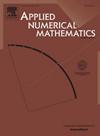椭圆型方程点跟踪最优控制问题的自适应HDG方法
IF 2.4
2区 数学
Q1 MATHEMATICS, APPLIED
引用次数: 0
摘要
本文研究了目标泛函中状态为点值的最优控制问题。采用杂化不连续伽辽金(HDG)方法逼近状态和伴随状态,采用变分离散化概念对控制进行离散化。利用Green函数的误差估计和Oswald插值,得到了控制变量、状态变量和伴随状态变量误差的可靠、有效的后验误差估计。通过数值算例验证了所得到的后验误差估计器的性能。本文章由计算机程序翻译,如有差异,请以英文原文为准。
An adaptive HDG method for the pointwise tracking optimal control problem of elliptic equations
In this paper, we study an optimal control problem with point values of the state in the objective functional. The state and adjoint state are approximated by a hybridized discontinuous Galerkin (HDG) method, and the control is discretized by the variational discretization concept. With the help of the error estimates of Green’s function and Oswald interpolation, reliable and efficient a posteriori error estimates for the errors in the control, state and adjoint state variables are obtained. Several numerical examples are provided to show the performance of the obtained a posteriori error estimators.
求助全文
通过发布文献求助,成功后即可免费获取论文全文。
去求助
来源期刊

Applied Numerical Mathematics
数学-应用数学
CiteScore
5.60
自引率
7.10%
发文量
225
审稿时长
7.2 months
期刊介绍:
The purpose of the journal is to provide a forum for the publication of high quality research and tutorial papers in computational mathematics. In addition to the traditional issues and problems in numerical analysis, the journal also publishes papers describing relevant applications in such fields as physics, fluid dynamics, engineering and other branches of applied science with a computational mathematics component. The journal strives to be flexible in the type of papers it publishes and their format. Equally desirable are:
(i) Full papers, which should be complete and relatively self-contained original contributions with an introduction that can be understood by the broad computational mathematics community. Both rigorous and heuristic styles are acceptable. Of particular interest are papers about new areas of research, in which other than strictly mathematical arguments may be important in establishing a basis for further developments.
(ii) Tutorial review papers, covering some of the important issues in Numerical Mathematics, Scientific Computing and their Applications. The journal will occasionally publish contributions which are larger than the usual format for regular papers.
(iii) Short notes, which present specific new results and techniques in a brief communication.
 求助内容:
求助内容: 应助结果提醒方式:
应助结果提醒方式:


